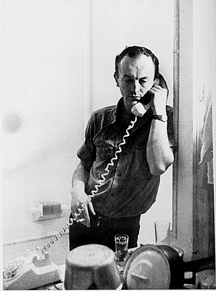 ¡@
¡@ ¡@ ¡@ |
O'HARA, Frank (1926--66), was born in Baltimore. Maryland, but grew up in Grafton, Massachusetts. He served in the US Navy, 1944-6, and from 1946 to 1950 he attended Harvard College, where he majored in music. After graduate school at Ann Arbor, he moved in 1951 to New York, where he was employed by the Museum of Modern Art. For the rest of his life O'Hara was deeply involved in the New York art scene, particularly with the work of abstract expressionist painterssuch as Willem De Kooning, Jackson Pollock, and Franz Kline. Between 1953 and 1955 he worked as editorial associate for Art News, for which his poet friends John Ashbery and James Schuyler also wrote. In 1955 he rejoined the staff of MOMA, where he was appointed assistant curator in 1960. In the early morning of 24 July 1966 he was struck and gravely injured by a beach-buggy on the beach of Fire Island, and died the following day. He is buried in Springs Cemetery on Long Island. |
O'Hara is best known for his I-do-this, I-do that poems, such as 'A Step Away From Them', 'Why I am Not a Painter', and 'The Day Lady Died' (an elegy for Billie Holliday, but some of his later longer poems, in particular 'In Memory of My Feelings' and 'Biotherm (for Bill Berkson)' are equally effective, and have proved influential on a host of younger poets.) Donald Allen edited his Collected Poems (New York, 1971; Manchester, 1991) and also a Selected Poems (New York, 1974). See also City Poet: The Life and Times of Frank O'Hara, by Brad Gooch (New York, 1993).
***The photo is from the
site created by Ted Stiffel, Christ Burgess, and Matt Lessem
This biography is from
Oxford Companion to 20th-Century Poetry, edited by Ian Hamilton
(Oxford: Oxford UP, 1994).
back to
Frank O'Hara